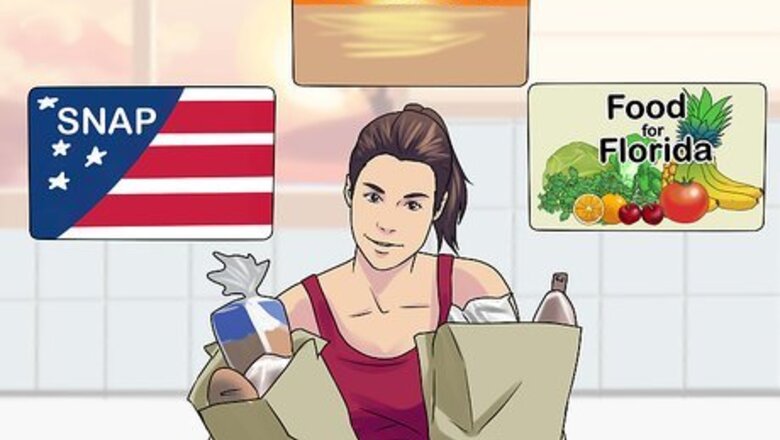
views
Meeting the Requirements
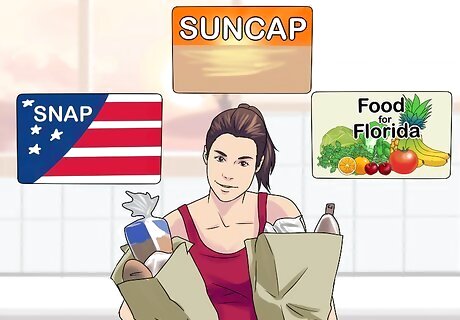
Determine which program is right for you. Three Florida programs offer assistance in buying food for residents. Figure out which one best suits your needs. The Supplemental Nutrition Assistance Program (SNAP) helps low-income households purchase healthy food. This is the default food assistance program. SUNCAP provides food assistance for individuals who receive Supplemental Security Income (SSI). If you already receive SSI, you may be eligible for SUNCAP benefits without additional paperwork or applications. Food for Florida provides help for people affected by disasters. Food for Florida is not always in effect, and is only available to people living in an active disaster area. Recipients must not currently receive assistance from the Food Assistance program or SUNCAP.

Find out if you meet the income guidelines. To be eligible for SNAP, most households must not exceed a gross income limit, which is equal to 200 percent of the Federal Poverty Level (FPL). For example, a household of two cannot make more than $2,622 per month. A household of three cannot make more than $3,300 per month. A household of four cannot make more than $3,976. For each additional person in the household, add $678 to this maximum monthly income. If a member of your household is disqualified from receiving food assistance benefits, you are required to meet a gross income limit less than or equal to 130 percent of the FPL. That is, for a household of two, you must now make $1,705 a month or lower. All households with a disqualified member must have a net income of 100 percent the FPL or lower -- that's a monthly income of $1,311 for a household of two, with $339 added for each person. A household member is disqualified if he/she was convicted of drug trafficking, ran away from a felony warrant, intentionally violated the SNAP rules in the past, or does not have the required citizenship or non-student status.
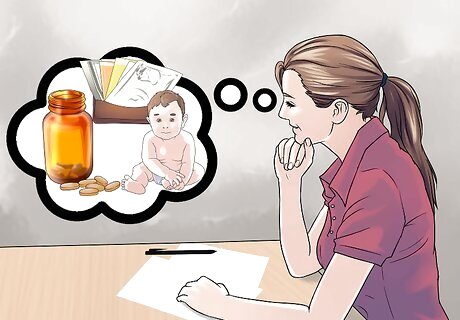
Figure out your deductions. If your monthly income exceeds the poverty guidelines, you may still qualify. Certain expenditures can be deducted from your monthly income. The following expenses can be deducted: Child care. Training for work or expenses in looking for work. Medicare expenses. Child support payments. A portion of shelter and utility costs.

Know your assets. There is also a limit to the value of the assets you possess. The limit is $3,250 for households with an elderly or disabled person. For households with a disqualified member, the asset limit is reduced to $2,250. However, some property is excluded from the calculation of assets. Those things are: Home and surrounding property. Household goods and personal effects. Burial plots. Life insurance policies. Vehicles.

Gather your information. To complete the online application for food assistance, collect documentation pertaining to household income; bills, including utilities and rent; medical bills; proof of child care costs; wage and employment information; and bank statements. All of this information will go into your application; it'll be easiest if you have it all organized now. All U.S. citizens must provide proof of U.S. citizenship and identity. Non-citizens are ineligible for food assistance unless they meet certain criteria. Lawfully admitted permanent residents, refugees, and those who have been granted asylum may apply. You must be able to provide a Social Security Number for each person who is applying for food stamp benefits, or proof that each person has applied for an SSN. To receive food stamps in Florida, you must be a Florida resident. The easiest way to demonstrate Florida residency is to show a valid Florida Driver's License or Florida-issued non-driver's photo ID.
Submitting a SNAP Application
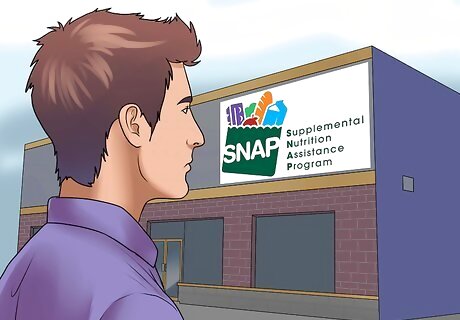
Locate your local SNAP office. A list of offices near you can be found on the Department of Agriculture's Food and Nutrition Service website. For a faster response, you can start an online application. ACCESS Florida allows you to apply for benefits online here. Click "Apply On-line for Food Stamps, Temporary Cash Assistance and Medicaid" located underneath the Apply for Benefits icon. Clicking this link will generate a code to access your account at any time. Make sure to save this access code for future reference.

Complete the application. Use the information you gathered earlier to fill out the application. This information is necessary to determine your eligibility, so be thorough and include every article the application requests from you. Forms are available in English, Spanish and Creole, but you can download other languages. If you are between the ages of 18 and 49 and physically and mentally fit, you must either be employed in some way or participating in a work training program to receive long-term benefits (unless you have a child). If you do meet these guidelines but are unemployed, you can only qualify for benefits for three months. If you're a student, you need to hold down a part-time job or have a child to qualify. If you fill out the online application, it should only take about 30 minutes to complete.

Review for accuracy before submitting the application. Any misinformation or lack of information can cause a delay in receiving benefits. What's more, falsifying information can make receiving benefits in the future difficult or impossible.

Submit the application. You will receive an e-mail confirmation if the application was sent successfully. Save this for your records. You should keep it in case you lose your information because you'll need your access code to log into the website. If you are mailing the application, mail to ACCESS Central Mail Center, P.O. Box 1770, Ocala, FL, 34478-1770. While you wait, you might as well use an online calculator to determine your benefits. You have to submit only the simplest information -- if you have your records handy, this will be even easier.
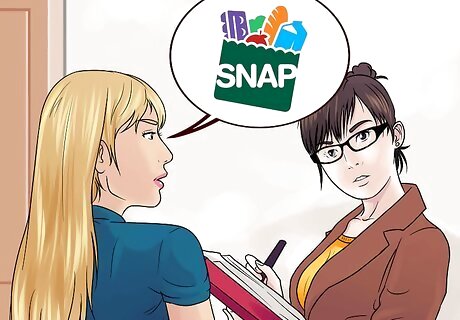
Use your access code to check your claim status periodically. The approval process can take up to 30 days to determine eligibility of benefits. You will be notified once the process is complete. Some Florida food assistance applications can be approved or denied in as little as two weeks, but don't be alarmed if it takes the full 30 days. You may qualify for expedited benefits. These are for the truly needy and are available after seven days. You will be asked a series of questions at the time of application for SNAP benefits to see if you qualify for expedited benefits. You generally will qualify for expedited benefits if the monthly, pre-tax income for your household is less than $150 or if your household has less than $100 in the bank. You also qualify if your monthly rent or mortgage payment, when combined with your utilities, exceeds your monthly pre-tax income and savings. For example, if your rent is $800 a month and your monthly utilities are $300, then you could qualify for expedited benefits if your combined pre-tax income and savings is less than $1,100.
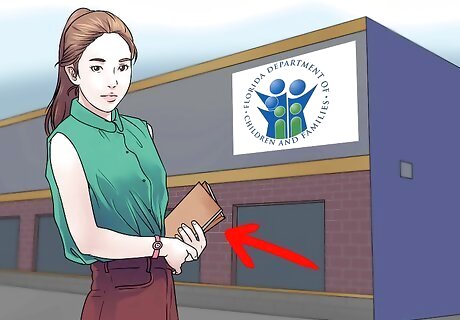
Prepare for the interview. You may be called in to the Florida Department of Children and Families (DCF) for an interview before you are awarded benefits. You will need to gather the information they request. Typically, they may request that you bring proof of the following: Your identity, such as a driver's license or state or military identification card. The earned or unearned income of every member of the family, such as the last four weeks of check stubs or child support notices
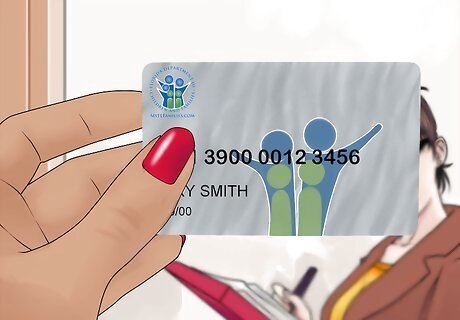
Receive your EBT card. You will receive an Electronic Benefits Transfer (EBT) card in the mail within 7 days of your application is approved. You can use this card as you would a debit or credit card at locations that accept EBT. Keep your EBT card safe. You must call EBT customer service at 1-888-356-3281 to have them reissue your card. Florida no longer issues paper food stamps or benefits checks for nutritional assistance programs. You will only receive your benefits on a preloaded EBT card.
Keeping Your Benefits
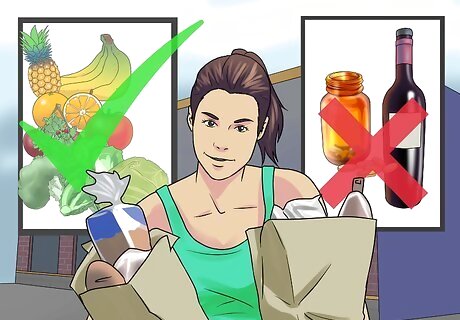
Follow the rules. You may use SNAP benefits to buy only certain items. You may buy fruits, meats, fish, dairy, breads and cereals. You may not use SNAP benefits to buy pet foods, soaps, paper products, alcohol, tobacco, medicine or foods to eat in the store.

Re-certify your benefits. You have to report to your local office to continue to receive benefits. Ask for the re-certification form. The timeline to re-certify depends on how regular your income is. Families with regular income must re-certify once per year. Someone whose income fluctuates may have to report more regularly, such as once per month.

Inform the Florida DCF of any relevant income changes. If your household income increases above the maximum income threshold, you must inform the DCF. Report any changes in the cost of rent or utilities because these affect your qualification for the program. Failure to inform the DCF of important changes can lead to cancellation of your benefits.
Applying for Other Food Programs
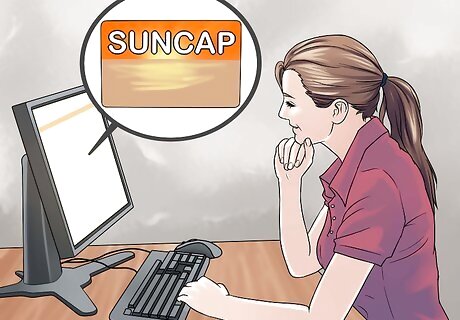
Check if you qualify for SUNCAP. If you receive Supplemental Security Income (SSI), you may qualify for SUNCAP without any other paperwork or applications. Also, if you received SNAP benefits but became eligible for SSI, then you may be switched over to SUNCAP from SNAP. However, if your food benefit were to decrease, then you could stay with SNAP benefits.

Determine if you qualify for Food For Florida if you have been affected by disaster. The Food For Florida program provides help for those people affected by disasters, such as a hurricane, and who have suffered at least one disaster effect: Damage to a home or self-employed business. Disaster-related expenses (such as loss of food), which are not being reimbursed. Lost income or income delayed for 15 days.

Gather documents. You will need to prove residency and income to qualify for benefits. Items you will need include: Verification of identification, such as a photo ID. Proof of residence, such as a driver's license or a utility bill. Proof of income, such as pay stubs, bank statements, etc.
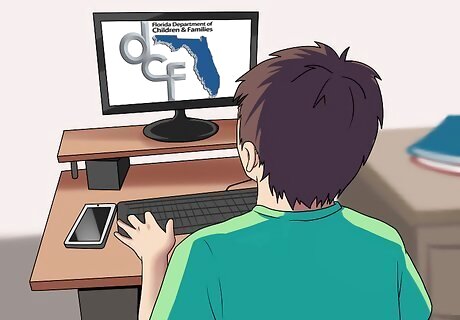
Apply for benefits. You may apply online at the Florida DCF. Applications are open only after a disaster has struck.


















Comments
0 comment